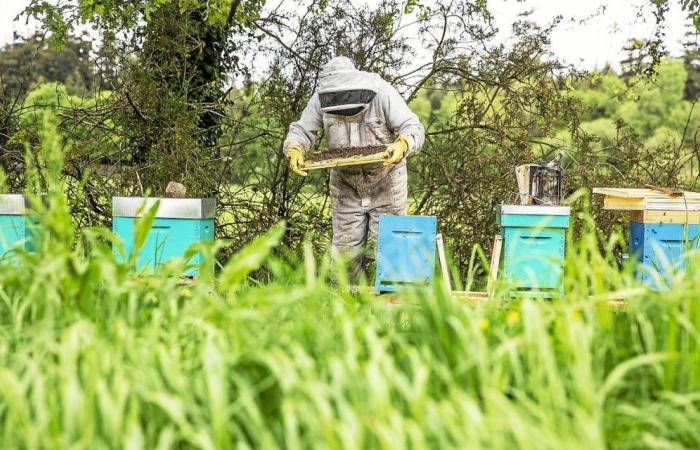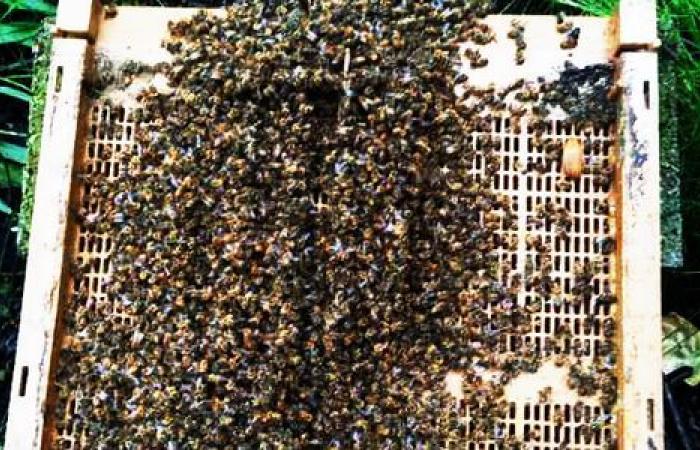The bees are buzzing. Worse: at the start of this rainy summer, they are starving. “It’s a disaster. In 47 years of beekeeping, I have never seen my bees in such a state of famine,” laments Gilles Lanio. The former president of the National Union of Beekeepers of France watches over a hundred hives in several towns on the left bank of the Lorient harbor. “There are always good and bad years in beekeeping, but this one is breaking records. We have never had such a rotten spring!”
“Water was leaking from my hives! »
The succession of bad days, regular rains and cool temperatures prevented his little protégées from collecting their precious nectar. “Below 15°C, they don’t come out. And the rain makes things much worse,” explains the beekeeper, now president of Api56. “The bees spent a lot of energy drying the wet nectar. Water was flowing from my hives!”
Entire colonies decimated
A few wingbeats away, Yann Maillet is suffering the blow. The Kervignacois lost “half” of his thirty hives. Knowing that a hive houses 40,000 to 60,000 bees, the massacre left around 750,000 dead. “The rain washed the flowers of their pollen, the bees could not come out, it created famine. They died of starvation,” notes the beekeeper, whose misfortune is far from being an isolated case.
Bee mortality during famine is generally sudden, massive and irreversible.
“The spring honey flow was almost non-existent for many beekeepers due to bad weather and this continues […] “Reserves are at their lowest and some beekeepers report having lost colonies due to famine,” reports the Observatory of Mortalities and Weakening of the Honeybee of Brittany. The latter recommended that beekeepers, at the end of May 2024, monitor their hives closely and supplement them if necessary “because bee mortality during famine is generally sudden, massive and irreversible.” The instruction was followed, to the point that the Languidic beekeeping equipment store, L’Espace Vert, almost ran out of syrup.
Honey shortage in sight
Honey is therefore likely to be scarce on the shelves in the coming months. “I left the little honey produced for my bees to feed themselves. There is not enough to make a honey flow,” notes Gilles Lanio. The beekeeper, who harvests up to 30 kg of honey per hive in good years and between 12 and 15 kg in bad years, is not counting on more than 5 kg this season. The same problem at the Morbihan Beekeeping Union’s school apiary in Languidic: “Usually we manage to have 30 to 40 kg of honey. This year, there is none at all,” notes Gonzague Collong, president of the union.
All hopes are now focused on the next three weeks. “The bramble is beginning to flower and we expect a lot from the chestnut tree. If it rains in the next few days, it’s ruined,” anticipates the amateur beekeeper, owner of eight hives in Crac’h.
We want to sanitize nature too much, this does considerable harm to bees
Green desert
This gloomy weather is the straw that breaks the already full beekeepers’ back. “We already had varroa [une espèce d’acariens parasites de l’abeille, NDLR]pesticides, the Asian hornet… And now the weather!” lists Gonzague Collong. “It’s linked to the management of our environment: we’ve cleaned it up too much,” says Gilles Lanio. “We’ve removed the buckthorn, the holly, many very honey-producing species. We’re removing food from the bees. Our gardens, mowed and pruned, are green deserts and monocultures are not good for bees. We want to sanitize nature too much, this is causing considerable harm to the bees.”
“The hornet also paid”
The only bright spot on the horizon: the rain has also delayed the nesting of the yellow-legged hornet, the number one enemy of bees. “The advantage is that the nests will develop later, so they will be less populated and less aggressive,” emphasizes Gilles Lanio. The hornet has also paid.” At the Departmental Federation of Harmful Organism Defense Groups (FDGDON), Patrice Emeraud confirms: “After two years of increase, we are seeing a delay in the emergence of primary nests linked to unfavorable weather conditions.”
So, can we still hope to harvest some honey this season? Hope is slim. “The game is almost over,” laments Gilles Lanio. On our scale, we should mow less, leaving white clover. Avoid cutting banks, brambles and chestnut trees. It should also not rain, but neither you nor I can do anything about that.”







